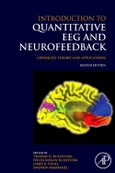The study of Quantitative EEGs and Neurofeedback offer a window into brain physiology and function via computer and statistical analyses, suggesting innovative approaches to the improvement of attention, anxiety, mood and behavior. Resources for understanding what QEEG and Neurofeedback is, how they are used, and to what disorders and patients they can be applied are scarce, and this volume serves as an ideal tool for clinical researchers and practicing clinicians, providing a broad overview of the most interesting topics relating to the techniques. The revised coverage of advancements, new applications (e.g. Aspberger's, music therapy, LORETA, etc.), and combinations of prior approaches make the second edition a necessary companion to the first. The top scholars in the field have been enlisted and contributions will offer both the breadth needed for an introductory scholar and the depth desired by a clinical professional.
Please Note: This is an On Demand product, delivery may take up to 11 working days after payment has been received.
Table of Contents
Section I: An Overview 1. Neurofeedback: The Frequency Domain Route to Health
Section II: Advancements in QEEG and Related Neurofeedback Practices 2. Advanced Practice of Neurofeedback using Quantitative EEG 3. Recent Advances in Quantitative EEG 4. Diagnosing and Treating Brain Dysfunctioning through the use of the LORETA 5. QEEG and Traumatic Brain Injuries 6. Neurofeedback Training Utilizing Real Time Z-Scores
Section III: Alternative/Supplementary EEG Treatment Approaches to Neurofeedback 7. Supplementing Neurofeedback with Audio-visual Entrainment/Disentrainment 8. Neurotherapy in the Multimodality Intervention: Creating a Treatment Tree for Severe Cases 9. "Brain Music" Treatment: A Brain/EEG/Music Interface 10. Hemoencephalography: Lighting Up Your Brain
Section IV: Recent Clinical Applications of Neurofeedback to Specific Disorders 11. Neurofeedback for Treatment of Depression: Current Status of Theoretical Issues and Clinical Research 12. Treatment of Attention Deficit Spectrum Disorders 13. Aspberger's Syndrome Intervention: Combining Neurofeedback, Biofeedback and Metacognition 14. Reactive Attachment Disorder Treatment 15. Understanding and Treating Post Traumatic Stress Disorder: The EEG Perspective 16. Neurofeedback in Pain Treatment 17. Neurofeedback with Anxiety/Panic Disorders 18. Neurofeedback in Alcohol and Drug Dependence
Section V: Ethical/Legal Issues 19. Ethical/Legal Issues in Neurofeedback








